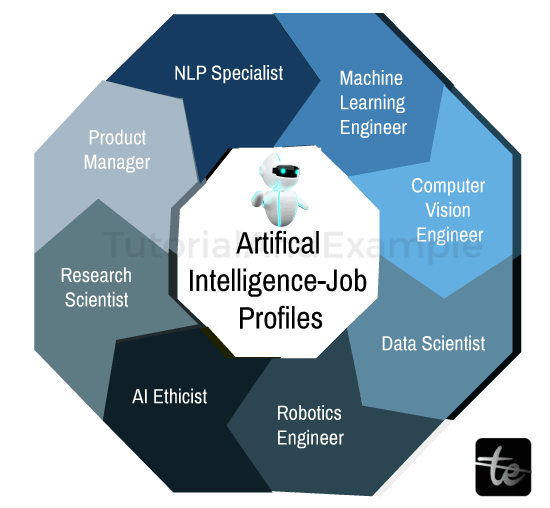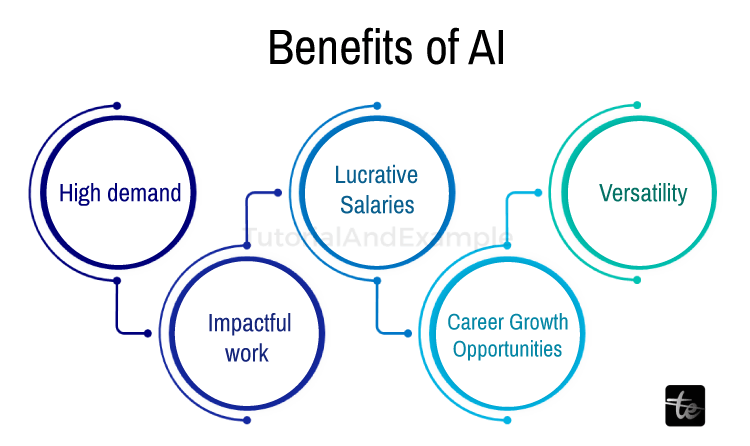Opportunities in Artificial Intelligence
Artificial Intelligence is a rapidly growing field and offer the great opportunities for everyone. AI specialists are in great demand and earn excellent incomes as they work on cutting-edge technology and solve complicated challenges.
A few of them are:
Machine Learning Engineer: These specialists create and execute algorithms and models that enable machines to learn from data. They create and improve machine learning algorithms, deals with huge datasets, and interact with data scientists and software developers.
Robotics Engineer: Robotics engineers design, develop, and program robots with AI capabilities. They develop intelligent systems capable of seeing their surroundings, making decisions, and interacting with humans. They are responsible for duties such as robot localization, motion planning, and human-robot interaction.
AI Ethicist: As AI continues to advance, ethical considerations become crucial. AI ethicists analyze the ethical implications of AI technologies, develop guidelines and policies, and ensure that AI systems are deployed responsibly, respecting privacy, fairness, and human values.
AI Research Scientist: AI research scientists undertake innovative studies to advance the area of AI. They investigate new algorithms, create new models, and publish research articles. Their work helps to advance AI technology and pushes the frontiers of what is achievable.
Computer Vision Engineer: These engineers specialize in developing algorithms and systems that enable machines to interpret and understand visual information. They focus on picture identification, object detection, and video analysis, among other things. Their research has potential in self-driving automobiles, surveillance, and medical imaging.

AI Engineer/Developer: These professionals specialize in designing and developing AI systems and applications. They work on implementing AI algorithms, integrating AI technologies, and optimizing system performance.
Data Scientist: Data scientists use statistical techniques and machine learning algorithms to analyze complicated datasets, extract useful insights, and construct prediction models. They apply their expertise to handle organizational difficulties, improve decision-making processes, and foster innovation.
AI Consultant: AI consultants provide strategic guidance to organizations on how to leverage AI technologies effectively. They assess business needs, identify AI opportunities, and develop implementation roadmaps.
AI Product Manager: AI product managers are in charge of the design and implementation of AI-based products and services. They collaborate closely with cross-functional teams to establish product requirements and guarantee client demands are met.
Natural Language Processing (NLP) Specialist: NLP professionals create algorithms and models that allow machines to interpret and process human language. They focus on problems such as speech recognition, language translation, sentiment analysis, and chatbots.
Various Uses and Applications of AI (Jobs)Opportunities:
Artificial intelligence (AI) have various uses and applications across industries. Here are some key areas where AI professionals contribute:
- Healthcare: AI is used in medical imaging for improved diagnostics, drug discovery, patient monitoring, and personalized medicine. AI algorithms can analyze medical images, detect abnormalities, and assist in early disease diagnosis.
- Finance: AI enables fraud detection, algorithmic trading, credit scoring, and risk assessment. Machine learning models analyze vast amounts of financial data to detect patterns, make predictions, and automate decision-making processes.
- Retail and E-commerce: AI is used for personalized product recommendations, demand forecasting, inventory management, and fraud detection. Computer vision technology enables visual search and augmented reality experiences for customers.
- Marketing and Advertising: AI analyzes customer behavior, preferences, and engagement patterns to optimize marketing campaigns. AI-powered algorithms automate ad targeting, content generation, and customer segmentation.
- Energy and Utilities: AI optimizes energy distribution, predicts demand, and improves energy efficiency. Machine learning algorithms analyze energy consumption patterns to optimize resource allocation and grid management.
- Agriculture: AI helps monitor crop health, predict yield, and optimize irrigation and fertilization. Computer vision algorithms analyze images of crops to detect diseases, pests, or nutrient deficiencies.
- Customer Service: AI-powered chatbots and virtual assistants improve customer service by providing quick and personalized responses. Natural language processing algorithms enable machines to understand and respond to customer queries.
- Autonomous Vehicles: Artificial intelligence (AI) is critical in self-driving automobiles, enabling perception, decision-making, and navigation. To recognize things, evaluate traffic scenarios, and make real-time driving judgments, AI systems process sensor data.
- Security and Surveillance: AI-powered systems enhance security through facial recognition, anomaly detection, and predictive analytics. AI algorithms analyze surveillance data to identify suspicious activities and ensure public safety.
- Education: AI is used in adaptive learning platforms, intelligent tutoring systems, and automated grading. Personalized learning paths are created based on individual student needs, and AI systems provide feedback and support to learners.
These are only a few instances of AI's numerous uses in many sectors.
The Future Scope for AI opportunities or jobs in India
The future scope for AI opportunities in India is promising. As AI technologies become more widely adopted across businesses, there is a rising demand for qualified AI specialists. Several factors contribute to India's bright prognosis for AI opportunities:
1.Talent Pool: India has many brilliant engineers, data scientists, and computer scientists. This skill pool lays a solid basis for the country's AI job development and growth.
2.Government Initiatives: The Indian government has recognized the potential of AI and has launched initiatives like the National AI Strategy and the AI for All program. These programs aim to promote AI research, development, and skill development, hence providing a favorable climate for AI job growth.
3. Industry Adoption: AI is being used by Indian businesses such as healthcare, banking, e-commerce, manufacturing, and education to increase efficiency, innovation, and consumer experiences. This adoption drives the need for AI professionals to develop and implement AI solutions.
4. Research and Academia: Indian research institutions and universities are actively involved in AI research and education. These institutions produce skilled AI professionals and contribute to advancements in AI technology.
5.Global Opportunities: Indian AI professionals have opportunities not only in the domestic market but also in the global arena. Many Indian AI professionals are sought after by international companies and research organizations, offering global exposure and career opportunities.
6. Emerging Technologies: Emerging technologies like autonomous vehicles, robotics, natural language processing, and computer vision have significant AI components. These technologies present exciting opportunities for AI professionals to work on groundbreaking projects and shape the future.
Aspiring AI experts must upgrade their skills on a regular basis, remain up to speed on the newest breakthroughs, and engage in appropriate training programs and certifications.
Benefits/Advantages
Artificial intelligence (AI) offers several benefits that make them attractive career choices.

Here are some of the key benefits of working in AI:
- High Demand: The demand for AI professionals is rapidly increasing across industries. Organizations are actively seeking AI talent to leverage the power of AI technologies for innovation, efficiency, and competitive advantage.
- Lucrative Salaries: AI professionals are in high demand, and their skills command competitive salaries. The specialized nature of AI roles often leads to higher compensation packages compared to many other fields.
- Career Growth Opportunities: AI is a fast-growing field with continuous advancements and evolving applications. This presents abundant opportunities for career growth, skill development, and staying at the forefront of technological innovation.
- Intellectual Stimulation: AI jobs involve tackling complex problems, developing innovative solutions, and working with cutting-edge technologies. This intellectual stimulation keeps professionals engaged and motivated, fostering a continuous learning environment.
- Impactful Work: AI has the potential to revolutionize industries and address real-world challenges. AI professionals have the opportunity to make a significant impact by developing solutions that improve healthcare, optimize business processes, enhance user experiences, and tackle global problems.
- Interdisciplinary Collaboration: AI jobs often require collaboration with professionals from diverse backgrounds, such as data scientists, engineers, domain experts, and business stakeholders. This interdisciplinary collaboration fosters a dynamic work environment and provides exposure to different perspectives.
- Versatility: AI abilities are transferrable across businesses and may be employed in a variety of fields such as healthcare, finance, retail, manufacturing, and others. This versatility provides opportunities for professionals to work in different sectors and explore diverse applications of AI.
- Continuous Learning and Innovation: AI is a field that constantly evolves, requiring professionals to stay updated with the latest research, techniques, and tools. This emphasis on continuous learning and innovation keeps AI jobs intellectually stimulating and fosters a culture of creativity.
- Solving Complex Problems: AI jobs often involve solving complex problems that were previously considered challenging or even impossible. The ability to develop AI models and algorithms that can analyze massive datasets and generate meaningful insights is highly rewarding.
Overall, AI jobs offer a combination of lucrative opportunities, intellectual stimulation, career growth, and the chance to make a meaningful impact through cutting-edge technology.
Conclusion:
In conclusion, working in artificial intelligence (AI) offers exciting opportunities in a rapidly increasing field that has significant effects on a wide range of organizations.
The demand for AI professionals continues to rise, leading to attractive career prospects and competitive salaries. AI jobs give intellectual stimulation, ongoing learning, and the chance to work with cutting-edge technologies.
AI experts have the opportunity to make a major difference by developing novel solutions to real-world problems. From healthcare to finance, manufacturing to customer service, AI is transforming industries and revolutionizing processes. AI professionals contribute to advancements in medical diagnostics, personalized recommendations, fraud detection, autonomous vehicles, and much more.